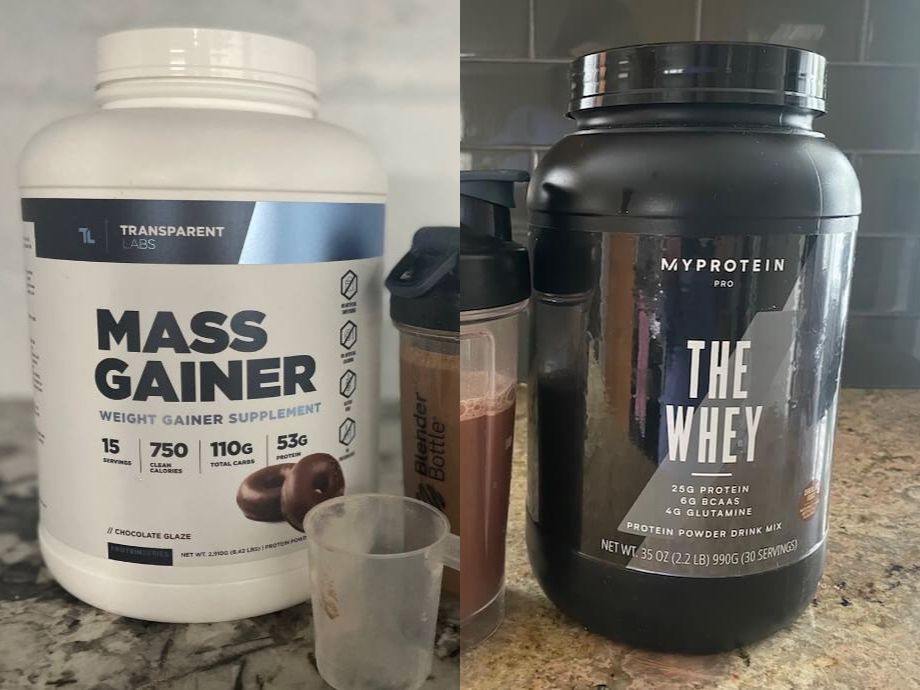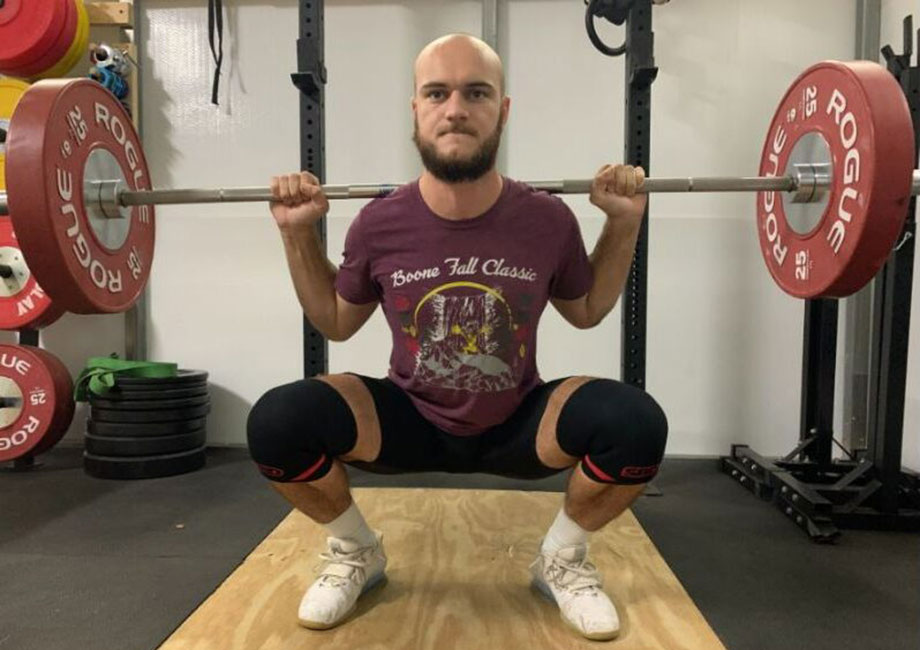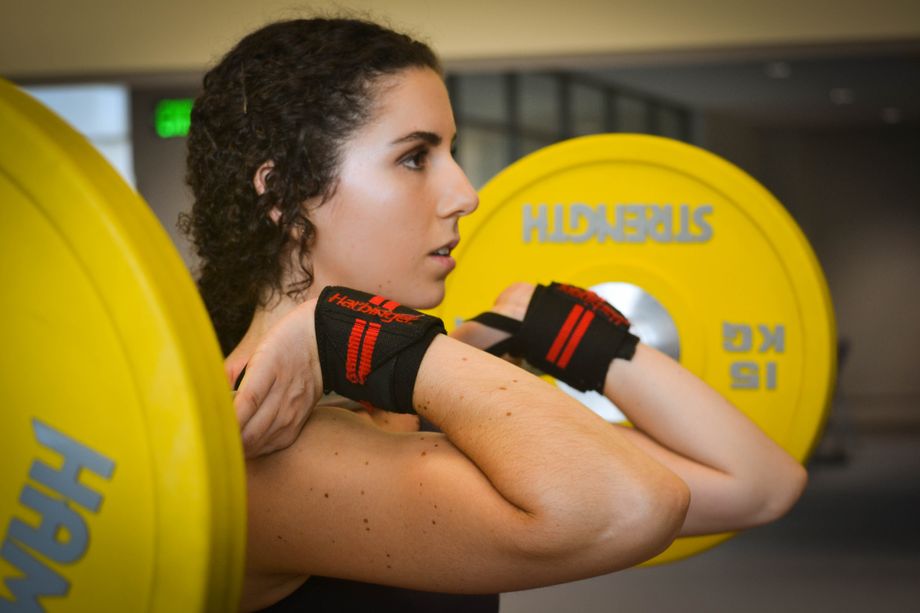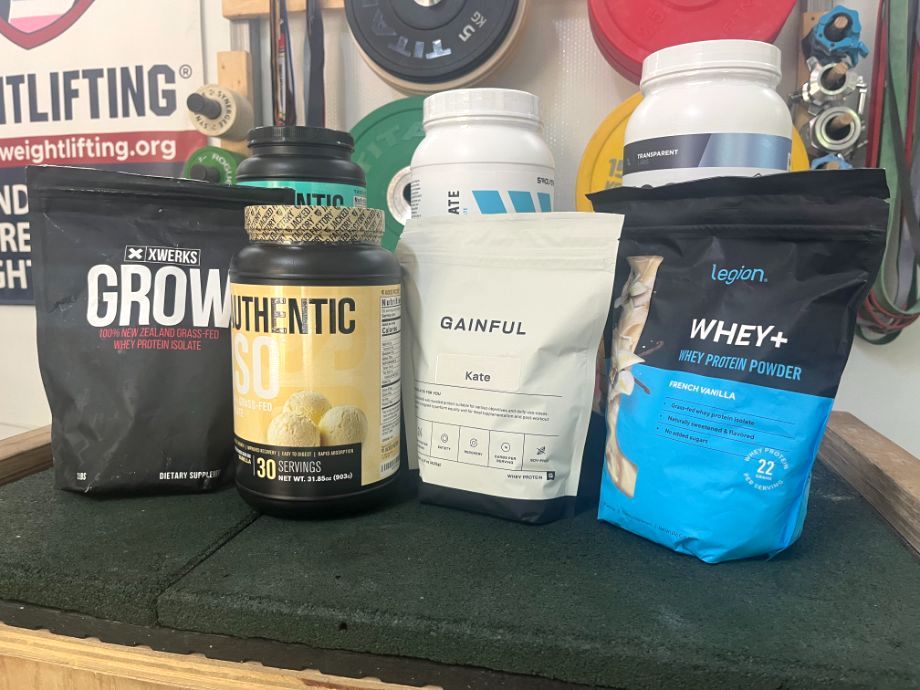Although it’s never been a problem for a superheavyweight Olympic weightlifter like me, some people struggle with gaining weight. Whether an athlete moving up a weight class, or just someone trying to bulk up and put on some mass, getting enough calories and protein to achieve those goals can be difficult. Sometimes, a supplement can be a help for those struggling to put on muscle mass or weight.
For building muscle and mass, there are mass gainers and whey protein powder, but which supplement should you use? When it comes to a mass gainer vs whey protein, which one is ideal for you depends on your goals.
I’ve talked with Meagan O’Connor, RD, a sports dietitian for USA Weightlifting, about the differences and benefits of each supplement. In this comparison, we’ll talk about the similarities and differences between these two supplements, as well as which one is best for your fitness needs and goals.
Medical disclaimer: This article is intended for educational and informational purposes only. It is not intended as a substitute for medical advice. For health advice, contact a licensed healthcare provider.
What Is Whey Protein?
The best protein powder is an easy way to help increase or meet your daily protein intake, and of those protein powders, whey is one of the most popular—and most researched. Whey is a by-product from milk during the cheesemaking process, where enzymes are added to separate milk into solid curds and liquid whey. The whey is then further processed, separated from fats and lactose, and filtered into a protein powder.
RELATED: What Is Whey Protein?
Benefits of Whey Protein
There are quite a few benefits of whey protein, but one the most well-known reasons is for increasing muscle mass and improving strength. A 2018 review1 asserts whey protein powder along with high-protein foods can help prevent muscle protein breakdown, which in turn can result in a positive protein balance that will initiate muscle protein synthesis—all resulting in muscle growth.
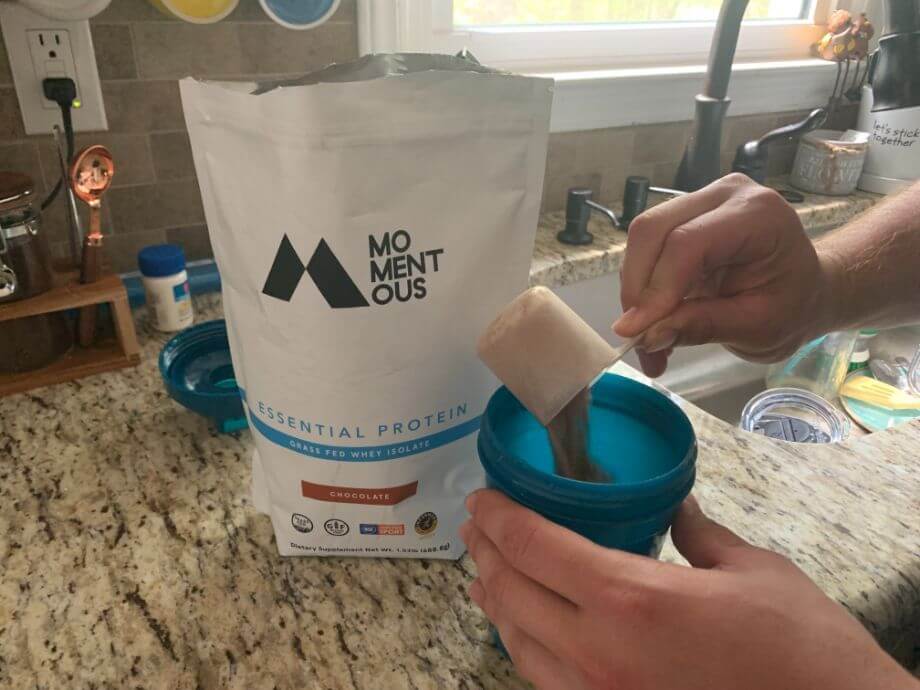
Another important benefit of whey protein is that as a protein supplement, it tends to be (mostly) pure protein. Because there are fewer fats and carbohydrates in whey, it’s not a calorie dense supplement, making it a great tool to help maintain lean muscle mass during weight loss. In addition, the high amount of leucine, an essential amino acid, in whey protein supplements can help build muscle while burning body fat.2
RELATED: Benefits of Protein
Types of Whey Protein
Depending on how the whey is processed and filtered, there are three different types of whey protein.
- Whey protein isolate: Of the three types of whey protein, this form of protein is often considered high-quality compared to the other wheys. This whey protein has been filtered heavily to remove most fat and lactose from the protein. Whey protein isolate is at least 90% protein3.
- Whey protein concentrate: Whey protein concentrate is not filtered as much as whey isolate and therefore has higher amounts of fat and lactose. Although often seen as lesser quality than whey protein isolate, their amino acid profiles are the same.
- Whey protein hydrolysate: Often used in formulas for infants or people with gastrointestinal issues, whey protein hydrolysate has had the whey protein partially broken down through hydrolysis.
What Is Mass Gainer?
A mass gainer, while often lumped in with other protein powders, is actually a combination of the three macronutrients: protein, fats, and carbohydrates. The exact ratio will vary from brand to brand, but typically it breaks down to a good amount of protein, a higher amount of carbs, and a lower amount of fat. Sometimes, micronutrients like creatine or different vitamins and minerals are added, but the macro ratio is the main constant in mass gainers.
Often the protein comes from a whey isolate, but can also be a blend of casein protein powder, egg white protein, or another type of protein. The carbs can be sourced from maltodextrin, a fast-acting carbohydrate derived from corn starch, or from natural sources like sweet potatoes and oats.

The ratio of macronutrients is to help support replenishing protein and carbs for energy, which is why these mass gainers tend to be high in protein and carbs, and low in fats. Meagan says on this, “There usually is minimal fat added so that the focus can be on replenishing protein and carbohydrate stores in the body, and added fat would slow that process down.”
Mass gainers are often called “weight gainers” and typically have a high calorie content (between 500 and 1,500 calories, although sometimes more). As their second name implies, the caloric content is used to help gym-goers increase calorie intake to enhance weight gain with the end goal of muscle growth.
RELATED: Best Protein Powder for Weight Gain
Mass gainer supplements are commonly used by bodybuilders, powerlifters, and other athletes to help build muscle and gain weight, but it can also be used for hard gainers, or people who have trouble gaining weight. Also, people needing to gain weight for a medical reason can also take a mass gainer for that purpose.
However, Meagan mentions that, “People shouldn’t rely solely on mass gainers for weight gain without still trying to eat a balance of real, whole foods throughout the day. These powders will lack fiber, vitamins, and minerals that your body needs and can easily get from eating a healthy diet.” So don’t skimp on real food in favor of mass gainers.
Similarities Between Mass Gainer and Whey Protein
Although these two dietary supplements can differ greatly in their use and content, let’s look at some similarities first.
Muscle-Building Benefits
Both whey protein and mass gainers can help you gain muscle. A December 2019 review4 states that muscle hypertrophy is based on the right balance between protein consumption and resistance training. Basically, the amount of new proteins built (through muscle protein synthesis) has to exceed the amount of protein broken down. So having either of these protein sources will aid you in getting enough protein in your diet to reap the most out of your workouts.
RELATED: Benefits of Protein Powder
Post-Workout Shake
Albeit often for different reasons, both whey protein and mass gainers are popular post-workout recovery drinks. The absorption rate of whey protein is fast, as a 2016 study5 showed that greater amounts of branched-chain amino acids were ready for absorption at 20, 60, and 90 minutes post-workout when consuming whey protein over casein or soy protein. This can help start muscle recovery sooner after a workout.

Because of the presence of all three macronutrients, mass gainers are often used post-workout as a meal replacement to help replenish lost nutrients, calories, and macros from the workout. However, since the fat content in a mass gainer is typically low, Meagan suggests a hard gainer could try adding nut butter to their protein shake for a more well-rounded—and more calorie-dense—shake.
Differences Between Mass Gainer and Whey Protein
Even though mass gainers often contain whey protein, it has quite a different content and goal than whey protein by itself. Let’s go over the differences of whey protein vs mass gainers.
Calorie Content
Mass gainers tend to have more calories per serving than whey protein—anywhere from 500 to over 1,500 calories—making them a convenient way to boost your daily calorie intake. Because of this, they can support healthy weight gain by getting you enough calories to have a calorie surplus.
The best whey protein powders tend to have far fewer calories, between 100 and 300 per serving, as the focus is solely on protein intake. This makes whey protein a better choice for a low-calorie supplement to support muscle-building and recovery.
Macro and Protein Content
Although mass gainers and whey protein powder can contain similar amounts of protein per serving, mass gainers will have less protein per gram of powder, simply because they have a balance of other macronutrients to provide more calories in each serving. This is why the serving size of the best mass gainers can be up to 100 grams or more, but still only provide about 25 grams of protein.
Whey protein, on the other hand, typically filters other macros out, to provide a more pure source of protein. One scoop of whey protein will provide the same amount of protein as four scoops of mass gainer. Additionally, its high content of essential amino acids allows whey protein to aid in muscle recovery after strength training and exercise, according to a 2018 review6.
RELATED: Best Supplements for Muscle Growth
Uses
The intended use of whey protein and mass gainers is different as well, although the end result may be similar. Mass gainers are calorie-dense supplements intended to enhance weight and muscle gain. When paired with a consistent strength training program, this can help fuel your body for increased muscle mass to help “bulk up.” However, if increasing your body weight isn’t your main goal, you could end up with unwanted fat from the surplus of calories.
RELATED: How To Make DIY Mass Gainer

Whey protein can be a more versatile option for building muscle, as its lower calorie content won’t cause excess weight gain while still providing protein to support muscle growth. According to the International Society of Sports Nutrition2, whey protein can be helpful in maintaining muscle mass while still losing body fat—something that the calories in a mass gainer simply can’t do.
Mass Gainer vs Whey Protein: Final Thoughts
So, which is better for your goals, mass gainer or whey protein? The main takeaway is that the supplement that will help you most depends almost entirely on your fitness goals. For someone trying to “bulk up” or who has trouble gaining weight, a mass gainer may be the better option to meet daily calorie needs. Still, whey protein is a low-calorie way to build muscle without excess calories, in case your goal is to maintain body weight, or even to lose body fat.
Keep these points in mind when deciding between whey protein and mass gainers:
- While the protein content per serving may be similar, mass gainers provide many more calories, typically between 500 and 1,500 calories.
- Whey protein is mostly protein, whereas mass gainers have a balanced ratio of protein, carbohydrates, and fats.
- Whey protein helps meet your daily protein needs, but mass gainers are more for getting enough calories in your diet.
- While both supplements have the end goal of muscle growth, they go about it different ways. Whey protein can help jump-start muscle protein synthesis and build lean muscle mass, but mass gainers use their carbohydrate content for energy, so that protein consumed can be used for building muscle mass.
Regardless of which supplement you choose, it’s best to consult a nutritionist or dietitian before beginning a new supplement regimen. Also, remember that these powders should only supplement a nutrient-dense diet with whole food sources.
Mass Gainer vs Whey Protein: FAQs
Which is better, whey protein or mass gainer?
Whether or not whey protein or mass gainer is better for you depends on what you’re looking to get out of it. Whey protein is a good way to add more protein to your diet while keeping the calorie count low, and a whey protein shake typically has between 100 and 300 calories a serving. Mass gainers are more about getting more calories in your diet, containing between 500 and 1,500 calories, and a balance of macronutrients: high in protein, higher in carbs, and lower in fats.
Whereas mass gainer is made with muscle and weight gain in mind, whey protein doesn’t have the caloric content of mass gainer, and is a better supplement for building lean muscle mass, if the goal is maintaining weight or even weight loss.
Should I take whey protein and mass gainer?
Taking mass gainer and whey protein together doesn’t have a lot of use, since mass gainer often contains whey protein already, usually upwards of 25 to 40 grams of protein in a serving. Ideally, the bulk of your macronutrients should come from nutrient-rich foods, so doubling up on these protein supplements may prevent you from getting adequate micronutrients—vitamins and minerals—from whole food sources.
What is the best protein for muscle gain?
Which protein powder is best for muscle gain will depend on your fitness goals. Here are our picks for the best protein powders for muscle gain:
Best Protein Powder for Muscle Gain Overall: Transparent Labs 100% Grass-Fed Whey Protein Isolate
Best Budget Protein Powder for Muscle Gain: Jacked Factory Authentic ISO
Best Natural Protein Powder for Muscle Gain: Legion Whey+
Best-Tasting Protein Powder for Muscle Gain: Xwerks Grow
Best Protein Powder for Muscle Gain with Unique Flavors: Kaged Re-Kaged
Best Protein Powder for Lean Muscle Gain: Ritual Essential Protein 18+
Best Grass-Fed Protein Powder for Muscle Gain: Momentous Grass-Fed Whey
Best Protein Powder for Muscle Gain Post-Workout: Garden of Life Sport Whey Protein
Best Personalized Protein Powder for Muscle Gain: Gainful
Best Hydrolyzed Protein Powder for Muscle Gain: Dymatize ISO 100
Best Casein Protein Powder for Muscle Gain: Transparent Labs Casein
Best Whey Isolate Protein Powder for Muscle Gain: 1st Phorm Phormula 1
Best Vegan Protein Powder for Muscle Gain: Vega Sport Plant Protein
These statements have not been evaluated by the Food and Drug Administration. This product is not intended to diagnose, treat, cure, or prevent any diseases.
References
- Tipton KD, Hamilton DL, Gallagher IJ. Assessing the Role of Muscle Protein Breakdown in Response to Nutrition and Exercise in Humans. Sports Med. 2018 Mar;48(Suppl 1):53-64. doi: 10.1007/s40279-017-0845-5. PMID: 29368185; PMCID: PMC5790854.
- Jäger R, Kerksick CM, Campbell BI, Cribb PJ, Wells SD, Skwiat TM, Purpura M, Ziegenfuss TN, Ferrando AA, Arent SM, Smith-Ryan AE, Stout JR, Arciero PJ, Ormsbee MJ, Taylor LW, Wilborn CD, Kalman DS, Kreider RB, Willoughby DS, Hoffman JR, Krzykowski JL, Antonio J. International Society of Sports Nutrition Position Stand: protein and exercise. J Int Soc Sports Nutr. 2017 Jun 20;14:20. doi: 10.1186/s12970-017-0177-8. PMID: 28642676; PMCID: PMC5477153.
- Madureira AR, Pereira CI, Gomes AMP, Pintado ME, Xavier Malcata F. Bovine whey proteins – Overview on their main biological properties. Food Res Int. 2007 Dec;40(10):1197–211. doi: 10.1016/j.foodres.2007.07.005. Epub 2007 Aug 3. PMCID: PMC7126817.
- Krzysztofik, M, Wilk, M, Wojdała, G, Gołaś, A. Maximizing muscle hypertrophy: a systematic review of advanced resistance training techniques and methods. Int J Environ Res Public Health. 2019;16(24):4897. doi:10.3390/ijerph16244897
- Kanda A, Nakayama K, Sanbongi C, Nagata M, Ikegami S, Itoh H. Effects of Whey, Caseinate, or Milk Protein Ingestion on Muscle Protein Synthesis after Exercise. Nutrients. 2016 Jun 3;8(6):339. doi: 10.3390/nu8060339. PMID: 27271661; PMCID: PMC4924180.
- Cintineo HP, Arent MA, Antonio J, Arent SM. Effects of Protein Supplementation on Performance and Recovery in Resistance and Endurance Training. Front Nutr. 2018 Sep 11;5:83. doi: 10.3389/fnut.2018.00083. PMID: 30255023; PMCID: PMC6142015.


